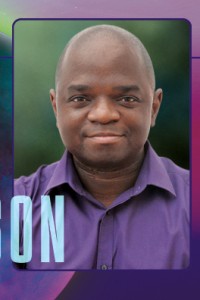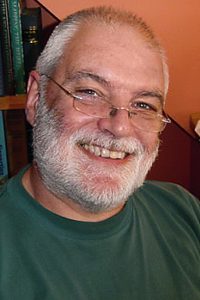Robert V.S. Redick: Sorcerer’s Apprentice
 Robert von Stein Redick was born in Charlottesville VA. He attended the University of Virginia, where he studied English and Russian, writing his undergraduate thesis on Ursula K. Le Guin. He went to graduate school at the University of Florida, where he earned a Master’s in tropical conservation and development. He briefly attended a graduate writing program at St. Mary’s College in Berkeley CA, but left after a year. He then took a year off before earning an MFA from the Warren Wilson Program for Writers in Asheville, North Carolina.
Robert von Stein Redick was born in Charlottesville VA. He attended the University of Virginia, where he studied English and Russian, writing his undergraduate thesis on Ursula K. Le Guin. He went to graduate school at the University of Florida, where he earned a Master’s in tropical conservation and development. He briefly attended a graduate writing program at St. Mary’s College in Berkeley CA, but left after a year. He then took a year off before earning an MFA from the Warren Wilson Program for Writers in Asheville, North Carolina.
Redick has traveled extensively in Latin America, especially Argentina and Colombia, where he taught in a bilingual school, worked for a human rights foundation, and wrote a study of park ranger training and management practices. He has edited the Spanish and French websites for Oxfam America, and was an instructor in the International Development, Community & Environment Program at Clark University in Worcester MA. He has also worked as a baker, translator, horse handler, lab technician, and stage critic for the Portland Phoenix and Valley Advocate.
Redick’s first novel, Conquistadors, is set in 1970s Argentina. Though it remains unpublished, selections have appeared in print, and the book was a finalist for the 2002 AWP/Thomas Dunne Novel Award. His first published novel, The Red Wolf Conspiracy (2008), launched his Chathrand Voyage series of seafaring epic fantasies, which continues with The Rats and the Ruling Sea (2009; as The Ruling Sea in the US) and will conclude with the forthcoming The River of Shadows (early 2011) and The Night of the Swarm (2012).
Redick lives in western Massachusetts with his partner Kiran Asher.
Website: Robert V.S. Redick | Bio
 ‘‘While doing my master’s in tropical conservation, I worked in Argentina. I worked with national park rangers, and got to visit some absolutely astonishing places. That experience influenced the books a lot. And the direct inspiration for the Chathrand Voyage books was about as dramatic as you can get. I was in this place called Peninsula Valdez, about halfway down the Patagonian coast – a peninsula about the size of Connecticut which at the time had about 250 people living on it. Connected by a little land bridge to the coast, it’s all provincial park. I was there with the rangers for eleven days. Southern right whales and sea lions and Magellanic penguins all come to reproduce there, so it’s this nonstop wildlife extravaganza. You can literally walk along the cliffs and see right whale mothers and calves rolling in the waves, killer whales going by – it was just outrageous. Lying in the rangers’ cabins at night, you could hear the whales out in the waves, this deep organ-sound of their breathing and booming.
‘‘While doing my master’s in tropical conservation, I worked in Argentina. I worked with national park rangers, and got to visit some absolutely astonishing places. That experience influenced the books a lot. And the direct inspiration for the Chathrand Voyage books was about as dramatic as you can get. I was in this place called Peninsula Valdez, about halfway down the Patagonian coast – a peninsula about the size of Connecticut which at the time had about 250 people living on it. Connected by a little land bridge to the coast, it’s all provincial park. I was there with the rangers for eleven days. Southern right whales and sea lions and Magellanic penguins all come to reproduce there, so it’s this nonstop wildlife extravaganza. You can literally walk along the cliffs and see right whale mothers and calves rolling in the waves, killer whales going by – it was just outrageous. Lying in the rangers’ cabins at night, you could hear the whales out in the waves, this deep organ-sound of their breathing and booming.
 ‘‘I was off duty one morning and walking alone. The fog had come in, and I suddenly had this notion of a huge ship rushing towards the rocks, and destruction, out of the fog. I have no idea where the idea came from, but I never forgot it: the terrible thought of what a disaster it would be. I filed it away for years, and then in ’99 I got back there, doing research on Conquistadors. I was fortunate enough to be allowed to walk along on the Libertad, a training vessel for the Argentinian navy, and remembered that initial vision of the shipwreck. (In fact the first title for the series was going to be The Shipwrecks, which didn’t exactly seem like a marketer’s dream come true.)
‘‘I was off duty one morning and walking alone. The fog had come in, and I suddenly had this notion of a huge ship rushing towards the rocks, and destruction, out of the fog. I have no idea where the idea came from, but I never forgot it: the terrible thought of what a disaster it would be. I filed it away for years, and then in ’99 I got back there, doing research on Conquistadors. I was fortunate enough to be allowed to walk along on the Libertad, a training vessel for the Argentinian navy, and remembered that initial vision of the shipwreck. (In fact the first title for the series was going to be The Shipwrecks, which didn’t exactly seem like a marketer’s dream come true.)
‘‘The Chathrand Voyage books are very challenging to summarize – that’s another thing the marketers told me. There’s a 600-year-old ship, and then…. The story’s pretty involved. With The Red Wolf Conspiracy, the first book in the Chathrand series, I had set out writing a story that was going to be about how power gets expressed in the Haves and the Have-Nots, the privileged insiders of empire and those negotiating their survival on the fringes of it.”
…
‘‘I consider the worldbuilding as fundamental to the story’s success as the language, the characterization, anything else. I want it to be so airtight that at every moment, no matter how outrageous the events or the aspects of that world, it feels real. I take pains with that. It’s never all that it could be, but I just don’t hold back with that ambition at all. That may also be a legacy of roleplaying. As the referee, the game master, you do try to rise to that challenge.”
…
‘‘Mainstream writers could learn a great deal of humility from the amount of research that speculative fiction writers do. John Crowley takes more pains with his historical research than you could ever ask for – Connie Willis as well. And Michael Swanwick knew the Faust story and the history of that time in Central Europe brilliantly when he wrote Jack Faust. I have been blown away by the seriousness with which speculative fiction writers take on research. Their belief and intention and devotion to this world is humbling.”
…
‘‘I just want to say that I really am going to end the story with Book Four (The Night of the Swarm): it will be an absolute, definite and total conclusion. The story did expand from three books to four. But it will end there! I have so many things I want to write and explore after this series. I know the list will still be long when I drop dead one day.”


 Excerpts from the interview:
Excerpts from the interview:




Pingback:Tweets that mention Locus Online Perspectives » Robert V.S. Redick: Sorcerer’s Apprentice -- Topsy.com
Pingback:IDCE Winter Break News Links | IDCE News Blog